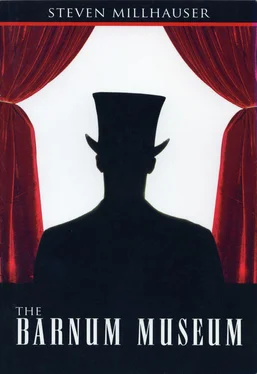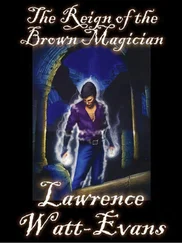Doors and passages.On the board there are seventeen doors, all exactly the same: yellow, with four gray panels. Like the furniture, they are pictured from above, in sharp perspective: they are inverted trapezoids, the top of each door being nearly twice the length of the bottom. The four corner rooms have a single door each; the DINING ROOM, the BILLIARD ROOM, and the LIBRARY, two doors each; the HALL, three doors; the BALLROOM, four. In addition to their single doors, each of the corner rooms has a SECRET PASSAGE, indicated by a black square containing a yellow arrow. When a token is in any of the four rooms containing a SECRET PASSAGE, it may, on its turn, advance immediately to the room diagonally opposite. The doors and passages are the secret life of the game, for they permit the tokens to enter and leave the nine rooms, and it is solely in the rooms, and not in the yellow squares or central rectangle, that play takes place, by means of continual guesses at the three cards concealed in the black envelope.
The pleasures of secret passages.Professor Plum walks in the SECRET PASSAGE between the LOUNGE and the CONSERVATORY. He enjoys traversing the house this way: the passage corresponds to something secretive, dark, and wayward in his temperament. The erratic earthen path, the dank stone walls, the dim yellow glow of irregularly placed kerosene lanterns, the spaces of near-dark, all these soothe and excite him, and bring back those boyhood rambles along the bank of the brook in the wood behind his father’s house. He thinks of Pope’s tunnel at Twickenham, of the emergence of eighteenth-century English gardens from the rigidity of French and Italian forms, of the grove of hickory trees in the wood, of asymmetrical architecture and the cult of genius. Professor Plum does not suffer from delusions of boldness. Part of the pleasure of the serpentine dark lies in knowing that he is walking between two well-known points, the LOUNGE and the CONSERVATORY, and it is precisely this knowledge that permits him to experience a pleasurable shiver at the appearance of a lizard in the path, the fall of a mysterious pebble, the ambiguous shadows that might conceal the murderer, the sudden extinction of a lantern on the wall.
A woman of mystery.Miss Scarlet enters the BALLROOM and sees with relief that she is alone. The silent piano, the empty window seat, the polished parquet floor, the high ceiling, the gloom of early evening coming through the high windows and making a twilight in the dying room, all these comfort her in a melancholy way, as if she might lose herself in the mauve shadows. And yet, as she crosses the floor to the window seat, she imagines herself observed, in her evening dress of close-fitting red silk (tight across the hips, flared below the knees, dropping to midcalf), takes note of the firm delicate neck, the soft waves and curls of her short blond hair, the slight but firm-set shoulders, the long svelte stride, the motion of hips under the small, elegant waist: a woman desirable and untouchable, a woman of mystery. She detests the Colonel. She detests him even as she imagines his eyes following her slow, swinging walk across the echoing room; detests his faintly flushed cheeks, his bristly brown-and-gray mustache, the small purplish vein at the side of his nose, the short neat hairs on the backs of his fingers, above all, those melancholy and relentless eyes. They are organs of touch, those eyes — she can feel his indecent gaze brushing the back of her neck, rubbing lightly against her calves, drawing itself like a silk scarf between the insides of her thighs, brushing and lightly rubbing. His eyes appear to include her in a conspiracy: let us, my dear, by all means continue this little farce of civility, but let us not pretend that you do not wish to be released from your restlessness by the touch of my thumbs against your stiffening nipples. The Colonel is patient; he appears to be waiting confidently for a sign from her. She asks herself suddenly: have I given him a sign? His eyes hold abysmal promises: come, I will teach you the disillusionment of the body, come, I will teach you the death of roses, the emptiness of orgasms in sun-flooded loveless rooms.
A warm night in August.It is nearly midnight on a warm August night in southern Connecticut. 11:56, to be exact. Through the screened windows of the Ross back porch comes a sharp smell of fresh-cut grass and the dank, salt-mud, low-tide smell from the Sound three blocks away. A stirring of warm air moves through the porch and touches the lightly sweating foreheads of the four Clue players. Six sounds can be distinguished: the shrill of crickets, the gravelly crunch of footsteps passing along the street at the side of the house, the rising and falling hiss of a neighbor’s lawn sprinkler, the faint music of a jukebox from a seaside bar ten blocks away where the summer people from New York and New Jersey have their cottages, the soft rush of trucks on the distant thruway, the hum of the air conditioner in the bedroom window of the neighboring house near the back porch. These sounds mingle with the snap of a pretzel, the scritch-scratch of a pencil, the click of an ice cube, the soft clatter of a tumbling die. The glow of porchlight spills beyond the screens and touches faintly the catalpa in the side yard. A solitary passerby, walking on the gravel at the side of the road, sees, through branches of Scotch pine and the exposed portion of the screens, the four players in their island of light, distinguishes a woman’s bending shoulder, a white upper arm, a tumble of dark thick hair, and feels a yearning so deep that he wants to cry out in anguish, though in fact he continues steadily, even cheerfully, on his way.
A pause on the way to the kitchen.Mrs. Peacock, proceeding toward the KITCHEN from the LOUNGE, pauses not far from a door to the DINING ROOM. Through the half-open door she can see part of the mahogany table, the branch of a silver candlestick, the gleam of the cut-glass bowl on the sideboard. Mrs. Peacock appears to be waiting for something, there by the partly open door. Does she expect to see a line of red blood trickling through the door, does she expect to hear the sound of a candlestick thunking against a skull? Her lavender dress is a trifle mussed from the day’s exertions, really it is far too warm in these airless corridors, she must look a fright. In the KITCHEN she will drink a glass of cool water. Mrs. Peacock prides herself on looking neat. She has always been attractive in a girlish sort of way, though too short: she has always had to look up into faces, as if offering herself for inspection: please notice my nice smile. Not like Edith White: all eyes turned when she entered a room. Mrs. Peacock thought he had noticed, but evidently she had been mistaken. Why is she lingering in the airless corridor? What is she waiting for? Through the half-open door of the DINING ROOM she can hear the silence, falling drop by drop.
Susan.Susan Newton glances up from her cards — the HALL, the LOUNGE, Colonel Mustard, the Lead Pipe, the Knife — and sees again the fatal profile: the line of David’s nose and upper lip exactly reproduces the line of Jacob’s, except for some faint difference difficult to account for. Is there more calm in David’s profile, less sense of inner force pushing outward into form? Susan is continually startled and disturbed by the physical likenesses among the Ross children: Marian has Jacob’s eye-brows and cheekbones, though her face and features are wider — she is less elegant, less beautiful than Jacob. Susan is struck by how all the Ross faces register emotions sharply, as if her own emotions were unable to find expression in her face, as if her face were an instrument less developed than theirs. The harmony of the faces at the card table excites her but shuts her out: she is so clearly alien. Although David’s kindness has touched her, she senses Marian’s dislike. Marian is a powerful woman with lines of tension between her eyebrows and a surprisingly rich, throaty laugh. It’s as if she is continually releasing herself from some constriction through the act of laughter. Jacob has been cold to Susan all evening. She is angry at him for making her come unannounced on David’s birthday, for making them late, for making her an accomplice. He has been sharp with her lately, unkind, impulsive, autocratic. She understands that his anger at himself, his furious disappointment, is making him desperate: perhaps he wishes to confirm his sense of failure by failing with her. The understanding does not help, for she can feel Jacob removing himself from her in a series of small, precise withdrawals. He will leave her soon, her homme fatal , she can feel it in her bones, and in her unhappiness she turns again to look at David, startled to see, in the long, slightly upturned upper lip, the thick, nervous eyelashes, the devastating hook of hair over the crisp collar, a purer, gentler Jacob. “Mrs. White,” Susan says. “In the kitchen. With the rope.”
Читать дальше












